

Join a culture where your desired behavior is the normal behavior. The 7 habits of highly effective people by Stephen Covey. The Habit Action List. By Leo Babauta There are a ton of people who read self-improvement blogs and books, but never put them into action.
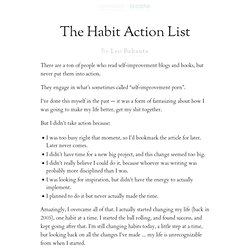
They engage in what’s sometimes called “self-improvement porn”. I’ve done this myself in the past — it was a form of fantasizing about how I was going to make my life better, get my shit together. But I didn’t take action because: I was too busy right that moment, so I’d bookmark the article for later. Amazingly, I overcame all of that. I figured out how to go from reading about changes, to actually taking action. What works to create action? 5 Common Mistakes That Cause New Habits to Fail (and What to Do About Them) The Interpersonal Neurobiology Behind Making Habits Stick.
Most of us walk around in this world in a trance with the delusional belief that we are only autonomous beings that are completely acting with free will.

However, many scientists agree that we are interdependent with our environments and our brains are constantly making snap judgments based on internal and external cues. You have recall this quote by Albert Einstein: “A human being is a part of the whole called by us universe, a part limited in time and space. He experiences himself, his thoughts and feeling as something separated from the rest, a kind of optical delusion of his consciousness. Starting The Fire (Of Motivation) In his best-selling book, The Happiness Advantage: The Seven Principles of Positive Psychology That Fuel Success and Performance at Work, Shawn Achor writes, “In physics, activation energy is the initial spark needed to catalyze a reaction.
The same energy, both physical and mental, is needed of people to overcome inertia and kickstart a positive habit” (Achor, 2011). Achor goes on to describe what he calls the “20 Second Rule” which states that a mere 20 seconds often makes all the difference in whether or not we will take action. When preparing for that action takes more than 20 seconds, the energy needed to start the action (activation energy) often overwhelms us and we remain stagnant. On the other hand, when the activation energy is less than 20 seconds, taking action seems much easier. What motivates us. Resistance to Change. Goal Setting. Start. Reward System. Self-Discipline.
Prospective Memory. How To Hack Your Habits: Author James Clear Shares His Life-Changing Strategy. Admit it: You’ve got a few pesky habits you’d like to kick.

Oh, and we know you’ve got big plans for how you’re going to change your ways. This Is How To Make Good Habits Stick. We all want to get to the gym, be more productive, be kinder to our loved ones… and then we don’t do it.
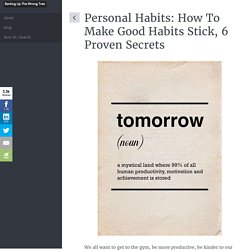
Why? Well, building solid personal habits can be hard. In fact, research shows it takes an average of 66 days to build a new good habit. How to Build a New Habit: This is Your Strategy Guide. According to researchers at Duke University, habits account for about 40 percent of our behaviors on any given day.
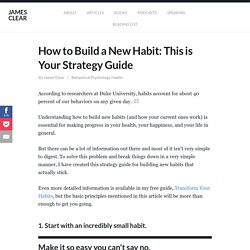
Understanding how to build new habits (and how your current ones work) is essential for making progress in your health, your happiness, and your life in general. But there can be a lot of information out there and most of it isn't very simple to digest. To solve this problem and break things down in a very simple manner, I have created this strategy guide for building new habits that actually stick. Even more detailed information is available in my free guide, Transform Your Habits, but the basic principles mentioned in this article will be more than enough to get you going. 1. Make it so easy you can't say no. Sun Tzu: How to Use Military Strategy to Build Better Habits. Sun Tzu was a legendary military strategist in ancient China and he is the author of the famous book, The Art of War.
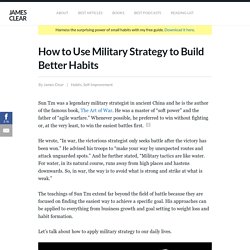
He was a master of “soft power” and the father of “agile warfare.” Whenever possible, he preferred to win without fighting or, at the very least, to win the easiest battles first. He wrote, “In war, the victorious strategist only seeks battle after the victory has been won.” The 5 Ways to Trigger a New Habit. In his best-selling book, The Power of Habit (audiobook), author Charles Duhigg explains a simple three-step process that all habits follow.
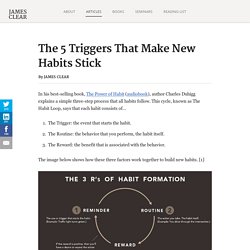
This cycle, known as The Habit Loop, says that each habit consists of… The Trigger: the event that starts the habit.The Routine: the behavior that you perform, the habit itself.The Reward: the benefit that is associated with the behavior. The image below shows how these three factors work together to build new habits. [1] How to Stick With Good Habits Every Day by Using the "Paper Clip Strategy" In 1993, a bank in Abbotsford, Canada hired a 23-year-old stock broker named Trent Dyrsmid.

Dyrsmid was a rookie so nobody at the firm expected too much of his performance. Moreover, Abbotsford was still a relatively small suburb back then, tucked away in the shadow of nearby Vancouver where most of the big business deals were being made. The first popular email services like AOL and Hotmail wouldn’t arrive for another two or three years. Geography still played a large role in business success and Abbotsford wasn’t exactly the home of blockbuster deals. How to Hack Your Habits. You know how it goes when you get triggered.
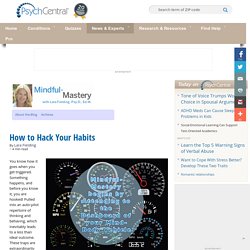
Something happens, and before you know it, you are hooked! Pulled into an auto-pilot repertoire of thinking and behaving, which inevitably leads to a less than ideal outcome. These traps are extraordinarily difficult for us to catch in flight precisely because they are so quick and automatic. The Smart Way to Stick to Habits.
The Four Tendencies. Cognitive Behavioral Therapy. Adaptation.